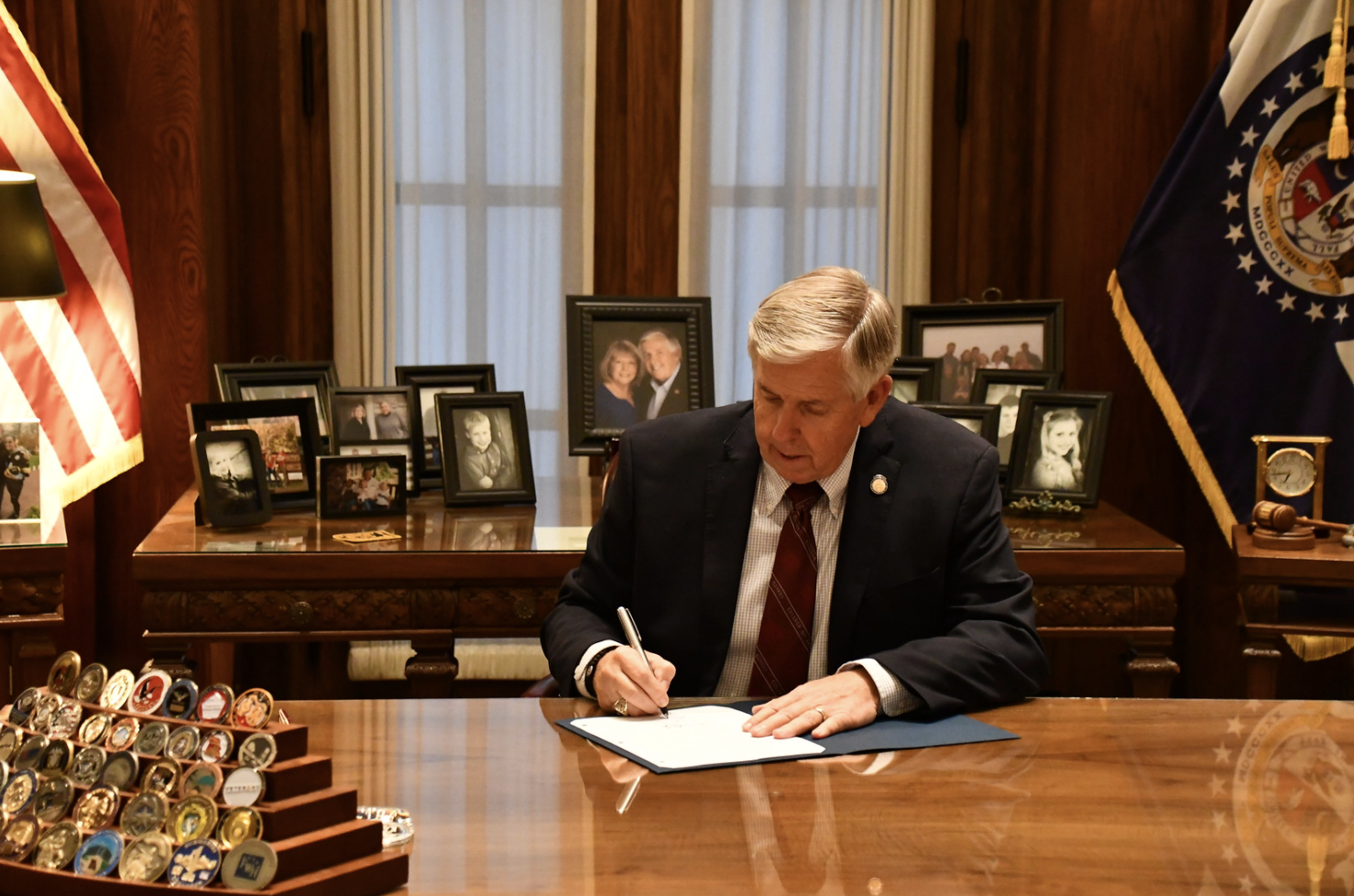JEFFERSON CITY, Mo. — Missouri’s chief executive rejected a handful of bills late Friday afternoon, just days ahead of the July 14th veto deadline.
Gov. Mike Parson vetoed six bills that covered a wide range of topics, from motorcycle helmet laws to the disposition of human remains to mining royalties. The quashed measures are SB 147, SB 202, SB 282, SB 414, HB 399, and HB 447.
Here’s a look at what Parson vetoed Friday.
Mining royalties
A bill requiring mining royalties be distributed portionately to each county in Missouri where the royalties accrued would have put the state in conflict with federal law, Parson’s veto letter stated.
“I understand the plight of these counties and agree that, logically, mining revenues should be distributed to the location where such mining actually occurred. However, federal law would need to change to achieve this goal. Unfortunately, that cannot be accomplished by a change to state statute,” Parson wrote.
SB 202, championed by Rep. Chris Dinkins and Sen. Gary Romine, would have put Missouri out of compliance with federal regulations and could ultimately cost Missouri to lose out on federal funding and resources.
“We will be working with the [federal government] to come up with the right language — they may even have to change or modify a rule on their level,” Romine told The Missouri Times. “Everyone understands the bill was good policy. It was just going to create a conflict with the federal Mining Royalty Act.”
Human remains
Parson also killed SB 282 with multiple measures pertaining to the disposition of human remains, including Sen. Jason Holsman’s provision allowing for “outdoor cremation facilities” operated by funeral establishments. The provision got some attention during the legislative session as it was nicknamed the “Jedi Disposal Act.”
“I’m disappointed. But most bills of this magnitude don’t make it through the entire process the first year they are filed,” Holsman, a Democrat, told The Missouri Times. “The governor felt the bill needed more work to narrow the scope. I look forward to having that discussion in the future.”
SB 282, from Republican Sen. Justin Brown, included additional changes to the death registration process, the definition of “surviving spouses,” and organ donation, in particular.
But Parson specifically pointed to the outdoor cremation provision of the bill for his reason for the veto.
“The burial of our loved ones or the disposal of their remains is deeply personal and should be treated with the utmost care and respect,” Parson wrote. “Without more thorough vetting to ensure that outdoor cremations can be conducted in a manner that fully disposes of the entire remains while also addressing the health and safety concerns of individuals who may be impacted nearby, I am not comfortable with allowing these types of ceremonies to be conducted in our state.”
Parson also vetoed HB 447 from Republican Rep. Dan Houx for a similar reason. An outdoor cremation provision was attached to the bill, which related to coroners, in the Senate. Parson said he rejected it because of the outdoor cremation measure, mirroring what he wrote about SB 282.
Health care
Two health care related bills — one on an innovation task force and the other altering requirements for the director of the Missouri Department of Health and Senior Services — were vetoed.
The issue with SB 414, sponsored by Sen. Paul Wieland, is the time frame laid out in the measure, according to the veto letter.
The measure created the “Missouri Health Insurance Innovation Task Force” with the purpose of soliciting concepts and making recommendations for a section 1332 innovation waiver application under the Affordable Care Act. It laid out a final report deadline of December 31, 2019, unless extended by a majority vote of the task force.
“[B]ecause of the impact to our state, any recommendations presented to my office and the General Assembly for legislation necessary to qualify for a Section 1332 waiver should be given adequate time to develop and consider. Senate Bill No. 414 places several deadlines on the work of the task force in developing their recommendations for a Section 1332 waiver that would be difficult to meet since an emergency clause was not adopted,” wrote Parson. “An issue of this importance should be carefully considered, with ample time to fully form recommendations and possible solutions.”
The issue with HB 399 is a provision to alter the requirements for the DHSS director.
The current requirement for the director to “be a graduate of an institution of higher education approved by recognized accrediting agencies, and shall have had the administrative experience necessary to enable him to successfully perform the duties of his office” was removed.
A provision in the measure would have required the director be “a medical doctor or a doctor of osteopathy degree” or “a Ph.D. in a health-related field, which may include nursing, public health, health policy, environmental health, community health, or health education or a master’s degree in public health or an equivalent academic degree from an institution of higher education approved by recognized accrediting agencies.”
“Limiting the Governor’s ability to appoint otherwise qualified candidates in this manner is not in the best interests of the state,” Parson wrote.
Helmet rules
Parson squashed a bill that would have granted certain Missourians the ability to operate motorcycles sans a helmet late Friday afternoon.
SB 147 included a provision that would have allowed individuals over the age of 18 who purchased special insurance to cover a potential accident be exempt from having to wear a helmet while driving a motorcycle in the state. This wasn’t the first time similar legislation was brought up in the General Assembly, but it has never been successful.
In his veto letter, Parson said the bill “contains many provisions of which I approve.” He didn’t specifically mention the helmet law changes but did point to other provisions in it, such as changes to driver’s license suspensions and a “Towing Task Force” as reasons for the veto.






















